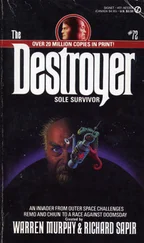By the time he got into a stall and latched the door, his nausea passed. Instead of throwing up, he leaned his back against the door and wept.
He hadn’t cried in many months, and he didn’t know why he was crying now. Maybe because he was on the trembling edge of happiness with the thought of seeing Nina again. Or maybe because he was scared of never finding her or of losing her a second time. Maybe he was grieving anew for Michelle and Chrissie. Maybe he had learned too many dreadful details about what had happened to Flight 353 and to the people on it.
Maybe it was all those things.
He was on a runaway rocket of emotion, and he needed to regain control of himself. He wasn’t going to be effective in his search for Rose and Nina if he swung wildly between euphoria and despair.
Red-eyed but recovered, he boarded the plane for Los Angeles as they issued the final call.
As the 737 took off, to Joe’s surprise his heart made a hollow racket in his ears, like running footsteps descending stairs. He clutched the arms of his seat as though he might tumble forward and fall headlong.
He had never been afraid on the flight to Denver, but now he was in the lap of terror. Coming eastward, he would have welcomed death, for the wrongness of outliving his family had been heavy on his mind — but now, westward bound, he had a reason to live.
Even when they had reached cruising altitude and levelled off, he remained edgy. He could too easily imagine one of the pilots turning to the other and saying, Are we recording?
Since Joe could not get Captain Delroy Blane out of his mind, anyway, he withdrew the three folded pages of the transcript from an inner jacket pocket. Reviewing it, he might see something that he had missed before — and he needed to keep his mind occupied, even if with this.
The flight wasn’t heavily booked, a third of the seats empty. He had a window seat with no immediate neighbour, so he was afforded the privacy he needed.
In response to his request, a flight attendant brought a pen and note pad.
As he read through the transcript, he extracted Blane’s dialogue and printed it on the note pad. Standing apart from First Officer Victor Santorelli’s increasingly frantic statements, and shorn of Barbara’s descriptions of sounds and pauses, the captain’s words might allow for the discovery of nuances otherwise not easy to spot.
When he was done, Joe folded the transcript and returned it to his coat pocket. Then he read from the note pad:
One of their names is Dr. Louis Blom.
One of their names is Dr. Keith Ramlock.
They’re doing bad things to me.
They’re mean to me.
Make them stop.
Are we recording?
Make them stop hurting me.
Are we recording?
Are we recording?
Make them stop or when I get the chance. when I get the chance, I’ll kill everybody. Everybody. I will. I’ll do it. I’ll kill everybody, and I’ll like it.
This is fun.
Whoooaaa. Here we go, Dr. Rumlock. Dr. Blom, here we go.
Whoooaaa. Are we recording?
Are we recording?
Oh, wow.
Oh, yeah.
Oh, yeah.
Now. Look.
Cool.
Joe didn’t see anything new in the material, but something he bad noticed before was more obvious when Blane’s dialogue was read in this extracted format. Although the captain was speaking in the voice of an adult, some of the things he was saying had a distinct childlike quality.
They’re doing bad things to me. They’re mean to me. Make them stop. Make them stop hurting me.
This was neither the phrasing nor the word choice most adults would use to accuse tormentors or to ask for help.
His longest speech, a threat to kill everybody and like it, was petulant and childish as well — especially when immediately followed by the observation This is fun.
Whoooaaa. Here we go. Whoooaaa. Oh, wow. Oh, yeah.
Blane’s reaction to the roll and plunge of the 747 was like that of a boy thrilling to the arrival of a roller coaster at the crown of the first hill on the track and, then, to the first stomach-rolling drop. According to Barbara, the captain had sounded unafraid; and there was no more terror in his words than in his tone of voice.
Now. Look.
Those words were spoken three and a half seconds before impact, as Blane watched the nightscape bloom like a black rose beyond the windscreen. He seemed gripped not by fear but by a sense of wonder.
Cool.
Joe stared at that final word for a long time, until the shiver it caused had passed, until he could consider all the implications of it with a measure of detachment.
Cool.
To the end, Blane reacted like a boy on an amusement-park ride. He had exhibited no more concern for his passengers and crew than a thoughtless and arrogant child might exhibit for the insects that he tortured with matches.
Cool.
Even a thoughtless child, as selfish as only the very young and the incurably immature can be, would nonetheless have shown some fear for himself Even a determinedly suicidal man, having leaped off a high ledge, would cry out in mortal fear if not regret as he hurtled toward the pavement. Yet this captain, in whatever altered state he occupied, watched oblivion approach with no apparent concern, even with delight, as though he recognized no physical threat to himself.
Cool.
Delroy Blane. Family man. Faithful husband. Devout Mormon.
Stable, loving, kind, compassionate. Successful, happy, healthy. Everything to live for. Cleared by the toxicological tests.
What’s wrong with this picture?
Cool.
A useless anger rose in Joe. It was not aimed at Blane, who surely was a victim too — though he didn’t initially appear to be one. This was the simmering anger of his childhood and adolescence, undirected and therefore likely to swell like the ever-hotter steam in a boiler with no pressure-release valve.
He tucked the note pad into his jacket pocket.
His hands curled into fists. Unclenching them was difficult. He wanted to strike something. Anything. Until he broke it. Until his knuckles split and bled.
Such blind anger always reminded him of his father.
Frank Carpenter had not been an angry person. The opposite. He never raised his voice in other than amusement and surprise and happy exclamation. He was a good man — inexplicably good and oddly optimistic, considering the suffering with which fate saddled him.
Joe, however, had been perpetually angry for him.
He could not remember his dad with two legs. Frank had lost the left one when his car was broadsided by a pickup truck driven by a nineteen-year-old drunk with lapsed insurance. Joe was not yet three years old at the time.
Frank and Donna, Joe’s mother, had been married with little more than two paycheques and their work clothes. To save money, they carried only liability coverage with their car. The drunk driver had no assets, and they received no compensation from any insurance company for the loss of the limb.
The leg was amputated halfway between knee and hip. In those days there were no highly effective prostheses. Besides, a false leg with any sort of functioning knee was expensive. Frank became so agile and quick with one leg and a crutch that he joked about entering a marathon.
Joe had never been ashamed of his father’s difference. He knew his dad not as a one-legged man with a peculiar lurching gait, but as a bedtime storyteller, an indefatigable player of Uncle Wiggly and other games, a patient softball coach.
The first serious fight he’d gotten into was when he was six, in first grade. A kid named Les Olner had referred to Frank as a ‘stupid cripple.’ Although Olner was a bully and bigger than Joe, his superior size was an insufficient advantage against the savage animal fury with which he was confronted. Joe beat the shit out of him. His intention was to put out Olner’s right eye, so he would know what it was like to live with one of two, but a teacher pulled him off the battered kid before he could half blind him.
Читать дальше












